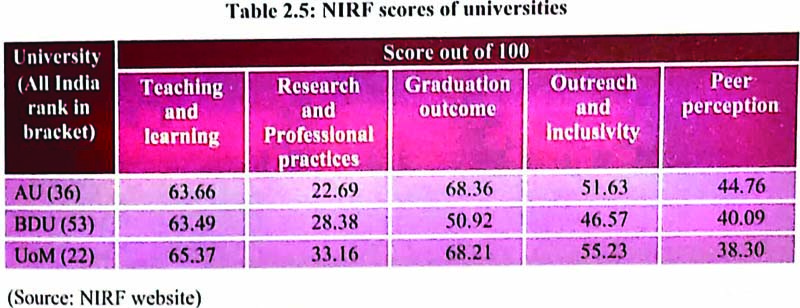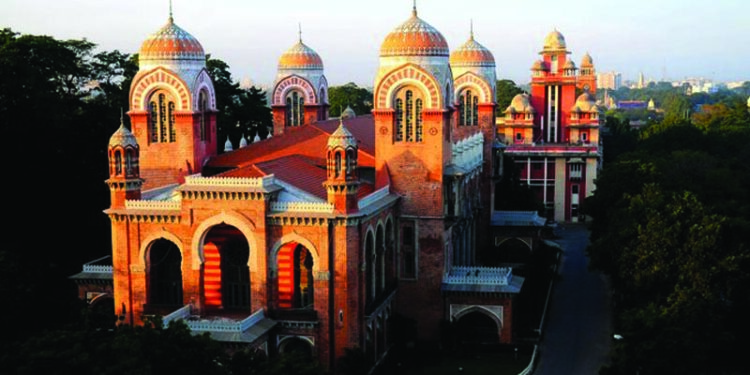NE NEWS SERVICE
CHENNAI, SEPT 14
The report of the Comptroller and Auditor General (CAG) of India for the year ended March 2020 has found serious lapses in higher education in Tamil Nadu. The lapses include poor or nil research output by many departments in universities. The report detected diversion of funds for research and development by the University of Madras to pay salaries and regular non-plan expenditure.
The report said the salaries paid to guest lecturers were much below the UGC-recommended salary of Rs 50,000. “The unfilled vacancies were filled up by appointing guest lecturers. As on March 2020, 4,084 guest lecturers were posted in government colleges with a salary of Rs 15,000 per month,” the report, tabled in the State Assembly on Monday, said.
The audit said the delay by the Tamil Nadu Teachers Recruitment Board (TRB) in recruiting teachers caused vacancies to increase. Guest lecturers were taken on a contract basis to cater to the need and were not recruited through transparent merit-based recruitment process, the report said. Against the total sanctioned strength of 10,079 teachers in government colleges, 4,889 permanent teachers were on roll, leaving 5,190 posts – about 51 percent – vacant. The vacancies in aided colleges were 22 percent (2,380 vacancies against sanctioned strength of 10,610). The large number of vacancies were managed mainly by engaging full-time guest lecturers.
During 2014-19, 17 programmes were newly started in 10 government colleges and 1,318 students were admitted without teachers for handling the programmes. The TRB planned to recruit 1,883 teachers for various subjects in 2016 but the government banned recruitment between April 2017 and June 2018 leading to non-completion of the recruitment process. The TRB recruited for 2,331 posts in October 2019 and the recruitment process remained incomplete as on February 2021, the report said.

In the University of Madras, it was found that the sanctioned intake of students for the PG programmes could not be increased for want of faculty and facilities. Due to low demand, the intake capacity of 63 programmes was reduced by 68 percent during 2014-19. During this period, no admission was made to 27 approved masters programmes.
“The University of Madras, the oldest in the State, continues to face financial crisis due to mismanagement and inadequate financial support from the government of Tamil Nadu. As a result, the funds meant for research and development activities were diverted for salaries and regular non-plan expenditure,” the report said.
The State performed well in student enrolment, pass percentage, access and affordability. The audit, however, found issues mainly with student-faculty ratio in colleges, valuation of answer papers, poor research output and regional disparity in access and ineffective functioning of governance structures. The Tamil Nadu State Council for Higher Education did not play its envisaged roles due to non-constitution of its main organ viz. the Council. Also, the State Academic Audit and Accreditation Council has not started functioning since its establishment in 2010.
During 2014 -19, about 1.48 lakh students of Bharatidasan University, Tiruchirappalli, Mother Teresa Women’s University, Kodaikanal, and University of Madras, Chennai, appealed for revaluation and 50 percent of them got their marks changed on revaluation. The large number requests for evaluation and change of marks after evaluation cast doubt on the efficiency of answer-sheet evaluation system, it said.
Only a handful of university departments were active in research and majority had poor or nil research output.
Addressing reporters on Monday, Principal Accountant General R Ambalavanan said, the audit includes the departments of Adi Dravidar & Tribal Welfare, Agriculture, Health & Family Welfare, Higher Education, Revenue & Disaster Management, Rural Development and Panchayat Raj, School Education and Social Welfare and Nutritious Meal.
He said that the report detected poor planning and implementation of installation of bio-digesterio-tank toilets under Swachh Bharat Mission (Gramin) resulting in non-achievement of objective of improved sanitation in rural areas and also led to unfruitful expenditure of Rs 4.44 crore.
Failure of the revenue authorities led to unauthorised occupation of government lands worth Rs 14.16 crore in Madurai while the failure of the agriculture department to frame a comprehensive guideline and to enforce the existing guidelines resulted in misuse of subsidy of Rs 3.01 crore besides non-achievement of the intended objectives of agriculture mechanization etc.
He also said that the compliance on the audit report by the concerned departments was a routine procedure. When asked about the large-scale violation found in the distribution of cash assistance to farmers last year, Mr Ambalavanan said that the concerned audit is going on now.









